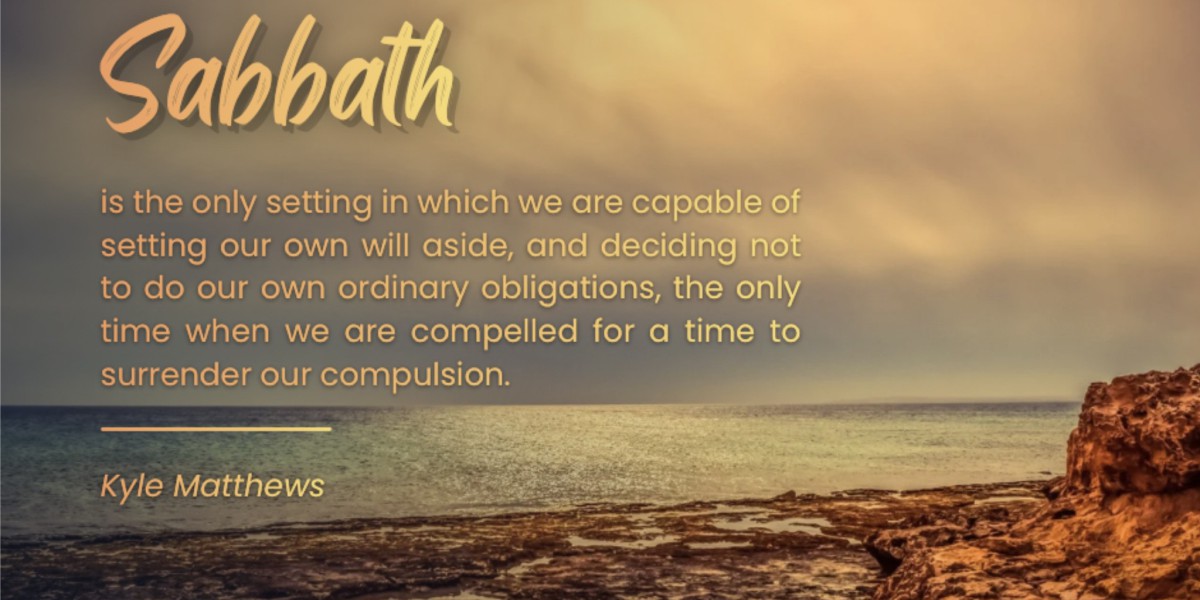Sabbath is most often rendered as meaning rest. And it’s often thought of as a day of worship. People rightly make these simple associations because resting is a really large part of Sabbath-keeping as is worship. But the truth is sabbath means stop or cease…not rest and not worship.
Why is this an important difference?
Because we are instructed in Scripture to remember the Sabbath and keep it holy. And whether we see Sabbath as stopping or as resting and worshipping will make all the difference in the world as it relates to whether we are remembering it and keeping it holy or doing something different…something adjacent.
We rest all the time, when we feel tired, when we eat meals, when we leave our jobs and when we go to sleep at night. But in all that we are never really stopping. We never come to the end of our labors and therefore never reach the end of ourselves. We strive and struggle to become and never stop to recognize who or what we have become from all our efforts. We acquire and accomplish and advance but never cease the effort ever, never pause and peak at our performance thus far.
Rest is a crucial component of Sabbath-keeping as is worship, but rest is not the focus of Sabbath nor worship.
Stopping. Ceasing. Setting down our tools. Setting aside our desires. Setting ourselves apart. That’s the focus for these few fantastic hours. And from that comes rest and restoration. In that we create worship.
Taking off from work on Sabbath but squandering the wonder of the day in video gaming or lazing about watching television is resting but not stopping. Avoiding our own careers while involving ourselves in the careers of others visiting restaurants and stores is resting but not ceasing. And not doing our job but also keeping the runaround going driving to religious meetings and occupying our day in services and ceremonies is worship but it’s not stoping and ceasing. All these are distractions from the fact we are still not stopping, still not ceasing, still not setting ourselves and our desires aside.
Rest is what we get when we stop. And worship is what we do through that stoppage. That’s what it is to Shabbat. It is to stop. It is to cease. If we put the rest first or the worship first then we will not stop. We will not cease. We will only transfer our ambition to another interest and keep right on going forward.
In Hebrew, rest is “menuha” or more specifically “stillness, and tranquility”. When we Shabbat we get Menuha. But when we seek menuha we miss Shabbat. Menuha encompasses a richer concept than merely ceasing from work; it involves serenity, joy, and spiritual fulfillment.
Menuha describes a deep, soul-level peace, and quietness, the kind of quiet as in the still waters of Psalm 23 our Good Shepherd leads us beside in His blessedness.
Ceasing creates a space and time for menuha to appear: both a physical and spiritual place and time of repose, security, and comfort.
Sabbath-keeping, truly setting down all our drive and desire to create and make and gain, produces a cheerful restfulness and harmony that was created on the first 7th Day, a time for delighting in Creation.
This is Spiritual Fulfillment only made possible when we rest, and that rest only possible when we cease. In a biblical sense, menuha is often linked to the Divine rest and inheritance our Heavenly Father promised His people, symbolizing a state of alignment with His will and reliance on His grace.
Ultimately, menuha is a profound state of shalom, being whole, complete, and at peace, a gift that allows for spiritual renewal and restoration.
But we can’t have it unless we Shabbat.
And we can’t mistake menuha for Shabbat. The peace comes from ceasing, not the other way around and mixing that up will make us miss out on both.
Second Guess First Assumptions
Question Everything
Get Biblical






